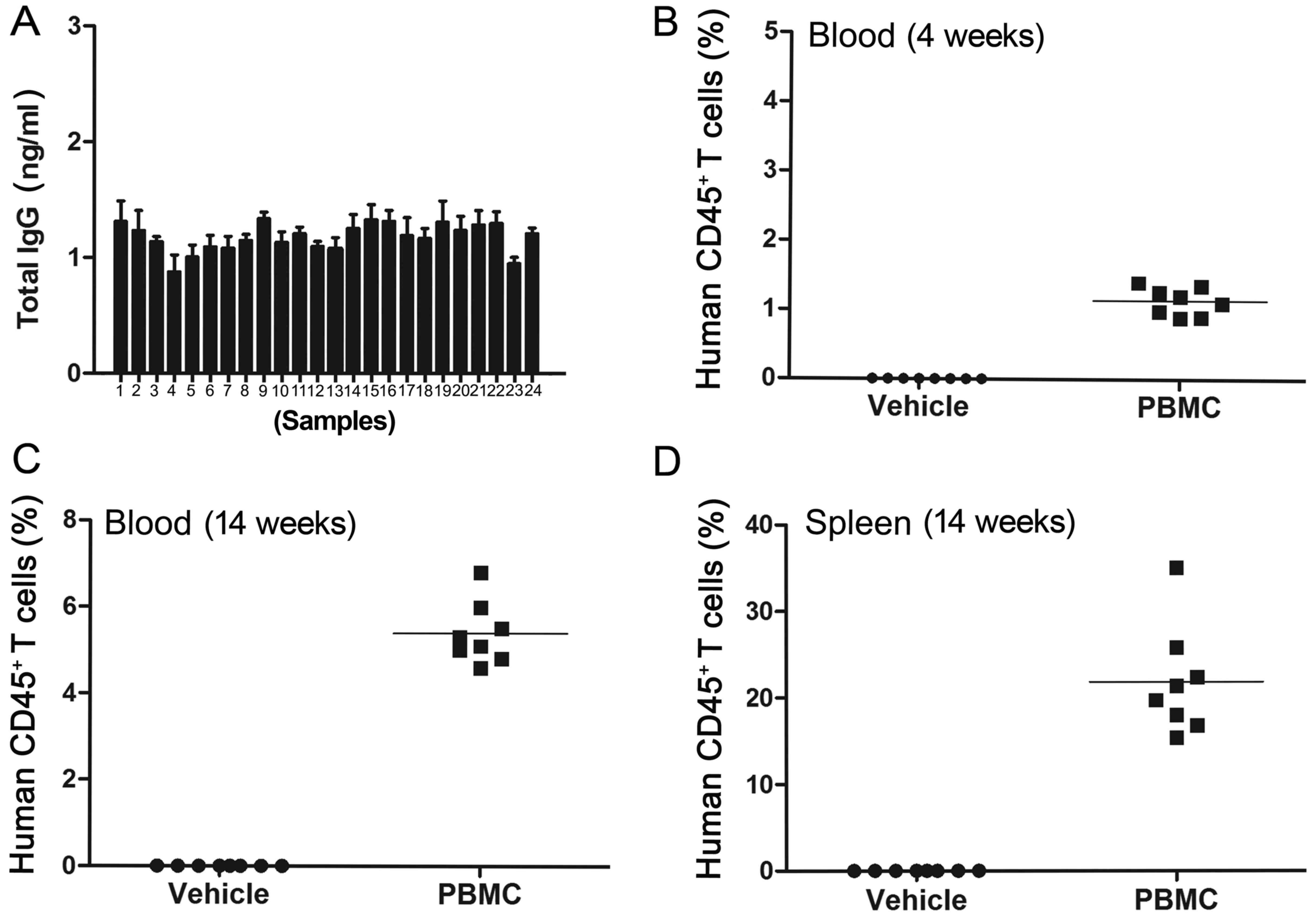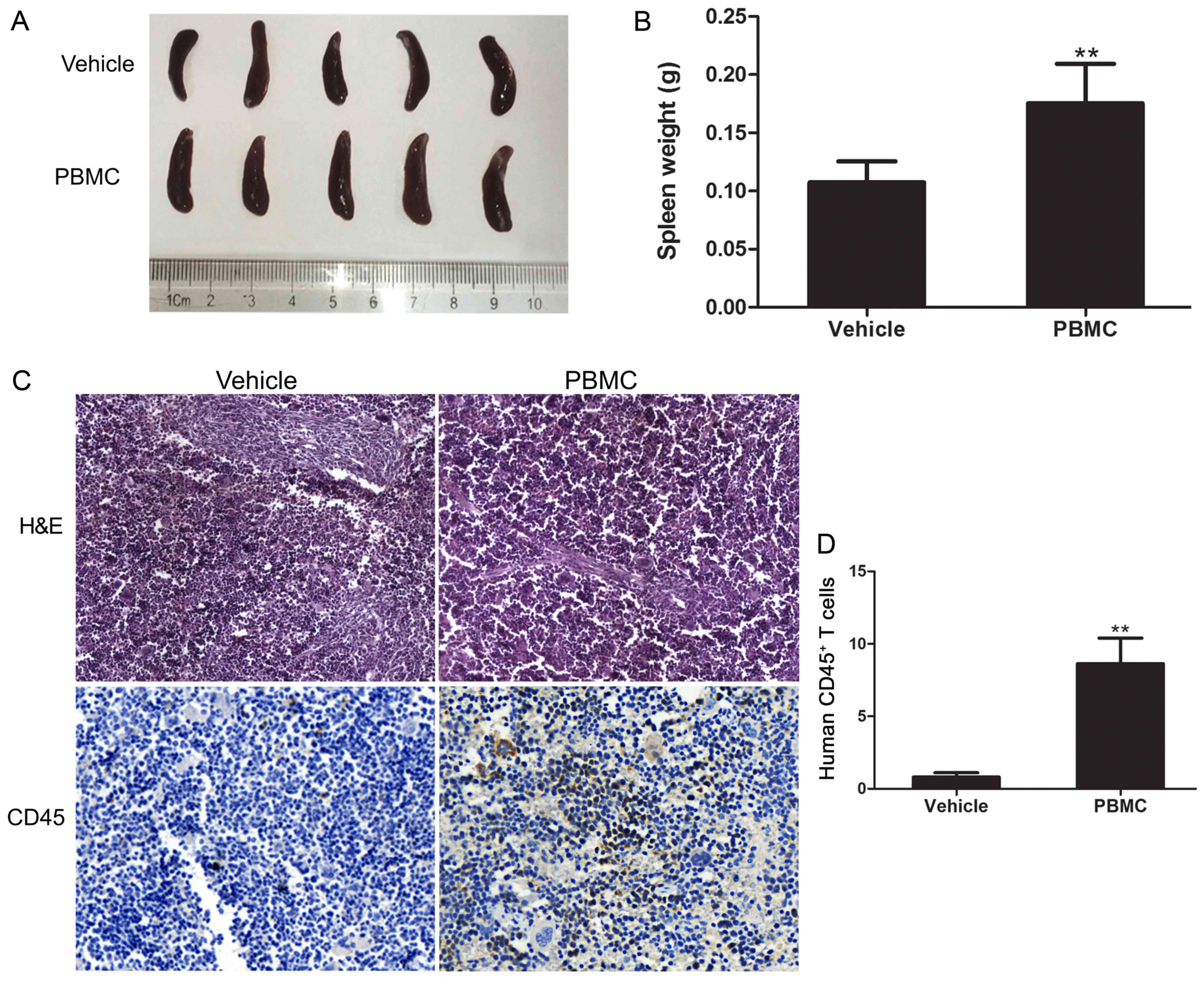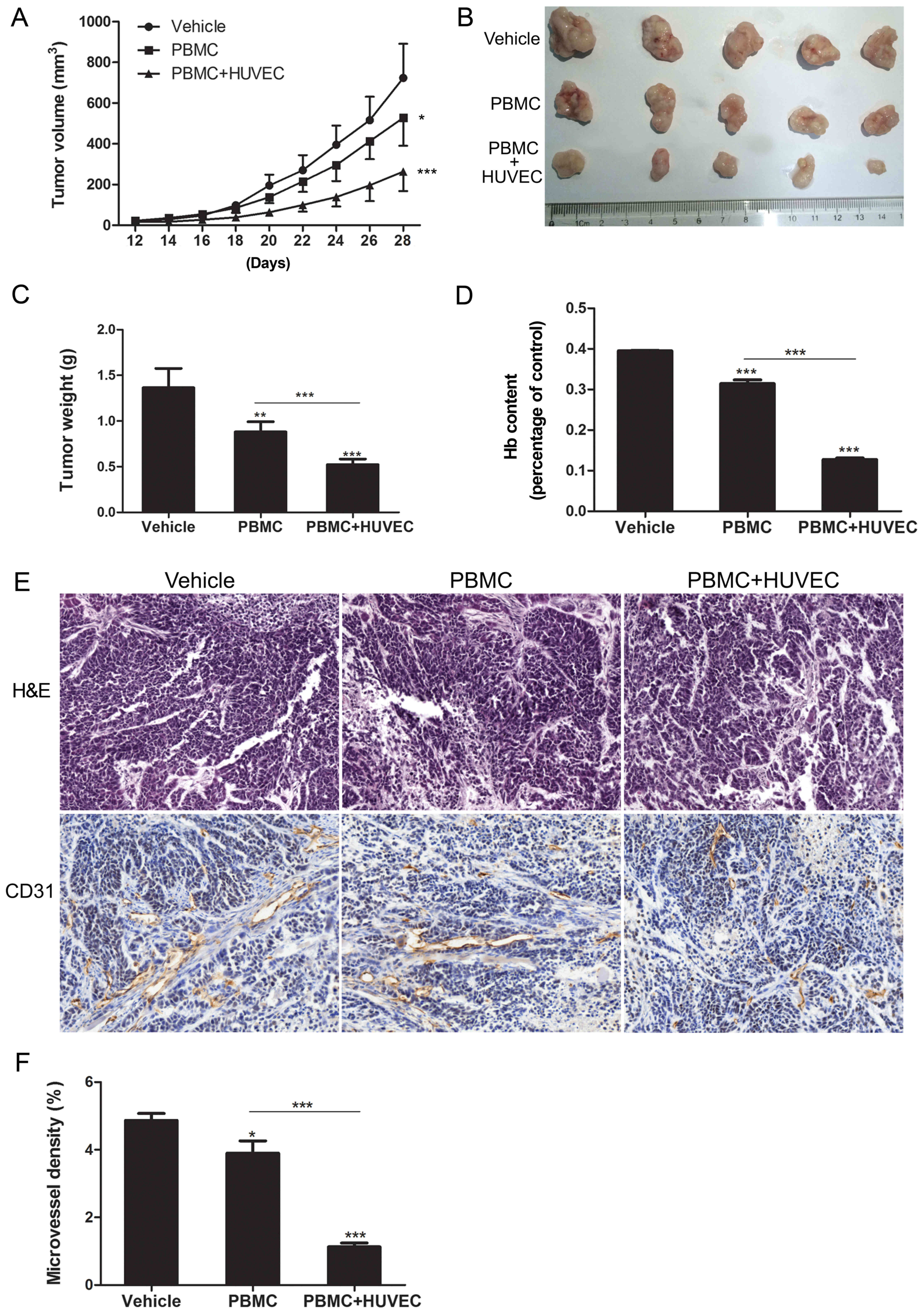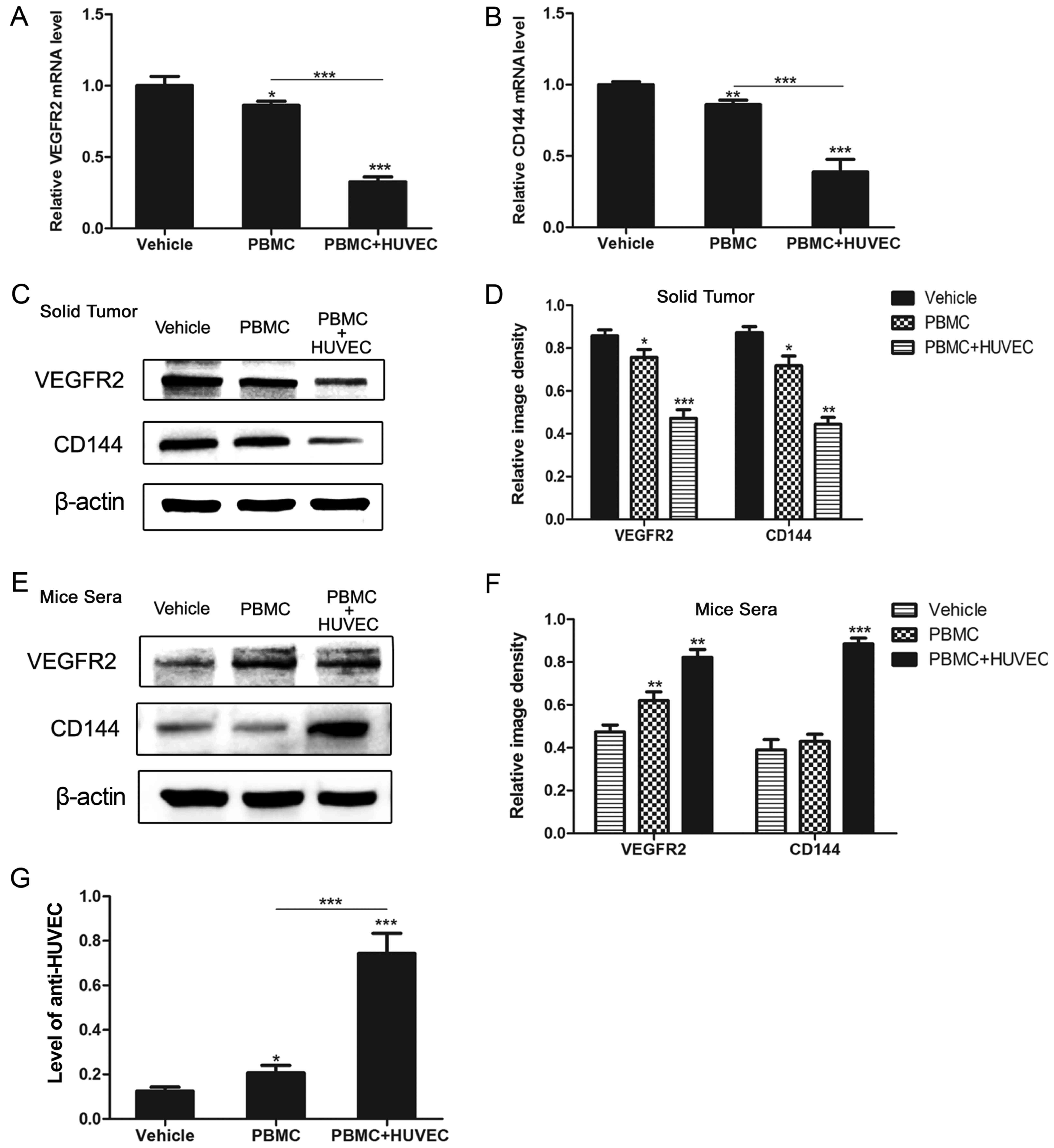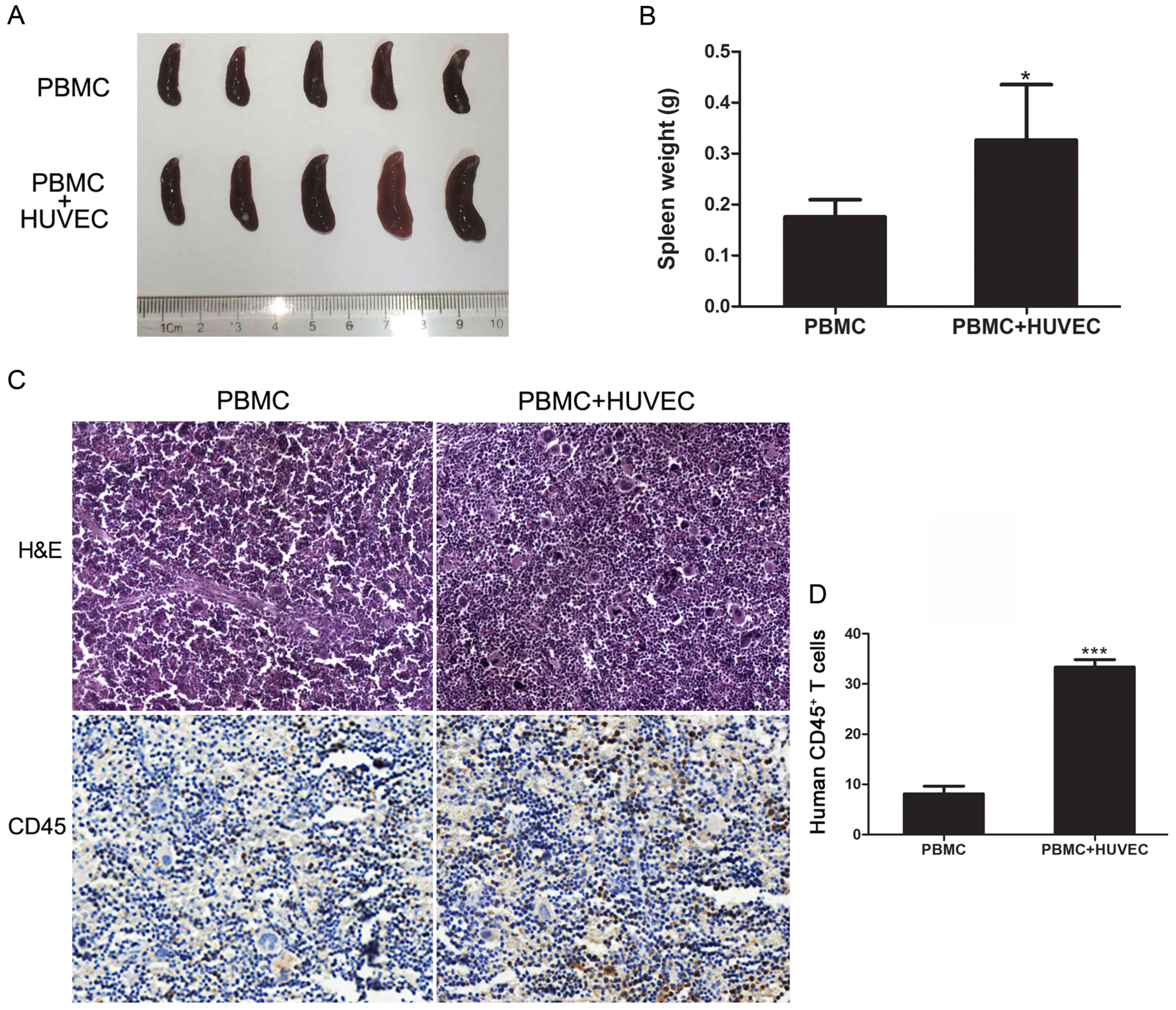|
1
|
Zhang Y: Epidemiology of esophageal
cancer. World J Gastroenterol. 19:5598–5606. 2013. View Article : Google Scholar : PubMed/NCBI
|
|
2
|
Pujol JL, De Pas T, Rittmeyer A, Vallieres
E, Kubisa B, Levchenko E, Wiesemann S, Masters GA, Shen R,
Tjulandin SA, et al: Safety and immunogenicity of the PRAME cancer
immunotherapeutic in patients with resected non-small cell lung
cancer: A phase I dose escalation study. J Thorac Oncol.
11:2208–2217. 2016. View Article : Google Scholar : PubMed/NCBI
|
|
3
|
Yang Y, Lu J, Liu H, Jin G, Bai R, Li X,
Wang D, Zhao J, Huang Y, Liu K, et al: Dendritic cells loading
autologous tumor lysate promote tumor angiogenesis. Tumour Biol.
37:15687–15695. 2016. View Article : Google Scholar
|
|
4
|
Weis SM and Cheresh DA: Tumor
angiogenesis: Molecular pathways and therapeutic targets. Nat Med.
17:1359–1370. 2011. View
Article : Google Scholar : PubMed/NCBI
|
|
5
|
Xu M, Xing Y, Zhou L, Yang X, Yao W, Xiao
W, Ge C, Ma Y, Yang J, Wu J, et al: Improved efficacy of
therapeutic vaccination with viable human umbilical vein
endothelial cells against murine melanoma by introduction of OK432
as adjuvant. Tumour Biol. 34:1399–1408. 2013. View Article : Google Scholar : PubMed/NCBI
|
|
6
|
Tanaka M, Tsuno NH, Fujii T, Todo T, Saito
N and Takahashi K: Human umbilical vein endothelial cell vaccine
therapy in patients with recurrent glioblastoma. Cancer Sci.
104:200–205. 2013. View Article : Google Scholar : PubMed/NCBI
|
|
7
|
Mu X, Sang Y, Fang C, Shao B, Yang L, Yao
K, Zhao X, Gou J, Wei Y, Yi T, et al: Immunotherapy of tumors with
human telomerase reverse transcriptase immortalized human umbilical
vein endothelial cells. Int J Oncol. 47:1901–1911. 2015. View Article : Google Scholar : PubMed/NCBI
|
|
8
|
Xu M, Zhou L, Zhang P, Lu Y, Ge C, Yao W,
Xing Y, Xiao W, Dong Y, Wu J, et al: Enhanced antitumor efficacy by
combination treatment with a human umbilical vein endothelial cell
vaccine and a tumor cell lysate-based vaccine. Tumour Biol.
34:3173–3182. 2013. View Article : Google Scholar : PubMed/NCBI
|
|
9
|
Ellis LM and Fidler IJ: Finding the tumor
copycat. Therapy fails, patients don't. Nat Med. 16:974–975. 2010.
View Article : Google Scholar : PubMed/NCBI
|
|
10
|
Sanmamed MF, Rodriguez I, Schalper KA,
Onate C, Azpilikueta A, Rodriguez-Ruiz ME, Morales-Kastresana A,
Labiano S, Perez-Gracia JL, Martín-Algarra S, et al: Nivolumab and
urelumab enhance antitumor activity of human T lymphocytes
engrafted in Rag2−/−IL2Rγnull immunodeficient
mice. Cancer Res. 75:3466–3478. 2015. View Article : Google Scholar : PubMed/NCBI
|
|
11
|
Theocharides AP, Rongvaux A, Fritsch K,
Flavell RA and Manz MG: Humanized hemato-lymphoid system mice.
Haematologica. 101:5–19. 2016. View Article : Google Scholar : PubMed/NCBI
|
|
12
|
Liu X, Li H, Liu J, Guan Y, Huang L, Tang
H and He J: Immune reconstitution from peripheral blood mononuclear
cells inhibits lung carcinoma growth in NOD/SCID mice. Oncol Lett.
8:1638–1644. 2014. View Article : Google Scholar : PubMed/NCBI
|
|
13
|
Banuelos SJ, Shultz LD, Greiner DL,
Burzenski LM, Gott B, Lyons BL, Rossini AA and Appel MC: Rejection
of human islets and human HLA-A2.1 transgenic mouse islets by
alloreactive human lymphocytes in immunodeficient NOD-scid
and NOD-Rag1nullPrf1null mice. Clin
Immunol. 112:273–283. 2004. View Article : Google Scholar : PubMed/NCBI
|
|
14
|
Lu J, Zhao J, Liu K, Zhao J, Yang H, Huang
Y, Qin Z, Bai R, Li P, Ma J, et al: MAPK/ERK1/2 signaling mediates
endothelial-like differentiation of immature DCs in the
microenvironment of esophageal squamous cell carcinoma. Cell Mol
Life Sci. 67:2091–2106. 2010. View Article : Google Scholar : PubMed/NCBI
|
|
15
|
Jin G, Zhao J, Yang YI, Liu K, Jiang Y,
Zhang X, Zhang Y, Huang Y, Lu J and Dong Z: JAK/STAT3 signaling
pathway mediates endothelial-like differentiation of immature
dendritic cells. Oncol Lett. 10:3471–3477. 2015. View Article : Google Scholar : PubMed/NCBI
|
|
16
|
King M, Pearson T, Shultz LD, Leif J,
Bottino R, Trucco M, Atkinson MA, Wasserfall C, Herold KC, Woodland
RT, et al: A new Hu-PBL model for the study of human islet
alloreactivity based on NOD-scid mice bearing a targeted mutation
in the IL-2 receptor gamma chain gene. Clin Immunol. 126:303–314.
2008. View Article : Google Scholar : PubMed/NCBI
|
|
17
|
Chen XY, Zhang W, Zhang W, Wu S, Bi F, Su
YJ, Tan XY, Liu JN and Zhang J: Vaccination with viable human
umbilical vein endothelial cells prevents metastatic tumors by
attack on tumor vasculature with both cellular and humoral
immunity. Clin Cancer Res. 12:5834–5840. 2006. View Article : Google Scholar : PubMed/NCBI
|
|
18
|
Holzapfel BM, Wagner F, Thibaudeau L,
Levesque JP and Hutmacher DW: Concise review: Humanized models of
tumor immunology in the 21st century: Convergence of cancer
research and tissue engineering. Stem Cells. 33:1696–1704. 2015.
View Article : Google Scholar : PubMed/NCBI
|
|
19
|
Brehm MA, Shultz LD and Greiner DL:
Humanized mouse models to study human diseases. Curr Opin
Endocrinol Diabetes Obes. 17:120–125. 2010. View Article : Google Scholar : PubMed/NCBI
|
|
20
|
Shultz LD, Ishikawa F and Greiner DL:
Humanized mice in translational biomedical research. Nat Rev
Immunol. 7:118–130. 2007. View
Article : Google Scholar : PubMed/NCBI
|
|
21
|
Shultz LD, Brehm MA, Garcia-Martinez JV
and Greiner DL: Humanized mice for immune system investigation:
Progress, promise and challenges. Nat Rev Immunol. 12:786–798.
2012. View
Article : Google Scholar : PubMed/NCBI
|
|
22
|
Gong Z, Xu H, Su Y, Wu W, Hao L and Han C:
Establishment of a novel bladder cancer xenograft model in
humanized immunodeficient mice. Cell Physiol Biochem. 37:1355–1368.
2015. View Article : Google Scholar : PubMed/NCBI
|
|
23
|
Yacoub-Youssef H, Marcheix B, Calise D,
Thiers JC, Therville N, Benoist H, Blaes N, Segui B, Dambrin C and
Thomsen M: Engraftment of human T, B and NK cells in CB.17
SCID/beige mice by transfer of human spleen cells. Transpl Immunol.
15:157–164. 2005. View Article : Google Scholar : PubMed/NCBI
|
|
24
|
Ji M, Jin X, Phillips P and Yi S: A
humanized mouse model to study human immune response in
xenotransplantation. Hepatobiliary Pancreat Dis Int. 11:494–498.
2012. View Article : Google Scholar : PubMed/NCBI
|
|
25
|
Folkman J: Angiogenesis: An organizing
principle for drug discovery? Nat Rev Drug Discov. 6:273–286. 2007.
View Article : Google Scholar : PubMed/NCBI
|
|
26
|
Wei YQ, Wang QR, Zhao X, Yang L, Tian L,
Lu Y, Kang B, Lu CJ, Huang MJ, Lou YY, et al: Immunotherapy of
tumors with xenogeneic endothelial cells as a vaccine. Nat Med.
6:1160–1166. 2000. View
Article : Google Scholar : PubMed/NCBI
|
|
27
|
Peiffer DS, Zimmerman NP, Wang LS, Ransom
BW, Carmella SG, Kuo CT, Siddiqui J, Chen JH, Oshima K, Huang YW,
et al: Chemoprevention of esophageal cancer with black raspberries,
their component anthocyanins, and a major anthocyanin metabolite,
protocatechuic acid. Cancer Prev Res. 7:574–584. 2014. View Article : Google Scholar
|
|
28
|
Dejana E and Giampietro C: Vascular
endothelial-cadherin and vascular stability. Curr Opin Hematol.
19:218–223. 2012. View Article : Google Scholar : PubMed/NCBI
|
|
29
|
Vestweber D: VE-cadherin: The major
endothelial adhesion molecule controlling cellular junctions and
blood vessel formation. Arterioscler Thromb Vasc Biol. 28:223–232.
2008. View Article : Google Scholar : PubMed/NCBI
|
|
30
|
Okaji Y, Tsuno NH, Saito S, Yoneyama S,
Tanaka M, Nagawa H and Takahashi K: Vaccines targeting tumour
angiogenesis-a novel strategy for cancer immunotherapy. Eur J Surg
Oncol. 32:363–370. 2006. View Article : Google Scholar : PubMed/NCBI
|















